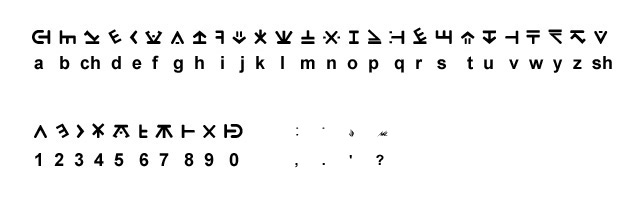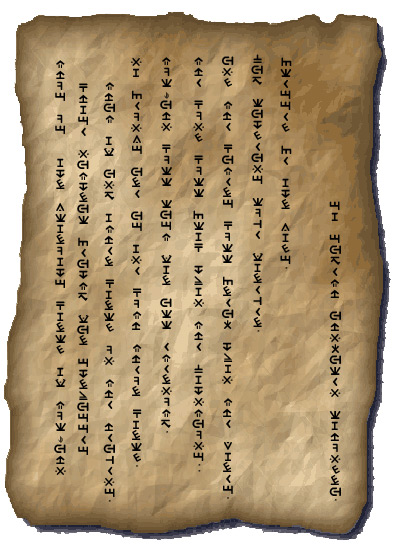Laudean/Ancient language: Difference between revisions
m (minor formatting) |
m (cate) |
||
| (3 intermediate revisions by 3 users not shown) | |||
| Line 1: | Line 1: | ||
{{UC}} | |||
{{AncLaud}} | {{AncLaud}} | ||
Ancient Laudean was lost for thousands of years, and only rediscovered recently by Professor Anson Robertson of the Federation Embassy. It consists of 10 numerical digits (0 through 9), and 26 alphabetic characters. Unlike "English", however, only 24 are traditional "letters" (missing the "c" and "x"), while two are actually consonant blends ("ch" and "sh"). As well, only four punctuation marks have been discovered so far. | Ancient Laudean was lost for thousands of years, and only rediscovered recently by Professor Anson Robertson of the Federation Embassy. It consists of 10 numerical digits (0 through 9), and 26 alphabetic characters. Unlike "English", however, only 24 are traditional "letters" (missing the "c" and "x"), while two are actually consonant blends ("ch" and "sh"). As well, only four punctuation marks have been discovered so far. | ||
| Line 5: | Line 6: | ||
[[Image:Ancient laudean example.jpg|right]]Ancient Laudean was written vertically, from left to right, not horizontally. Each "column" was considered a complete thought...a sentence. If a sentence was too long to fit on the medium and needed to be continued there would be a small space at the top of the next column (ie. an "indent") and the sentence would continue on from there. | [[Image:Ancient laudean example.jpg|right]]Ancient Laudean was written vertically, from left to right, not horizontally. Each "column" was considered a complete thought...a sentence. If a sentence was too long to fit on the medium and needed to be continued there would be a small space at the top of the next column (ie. an "indent") and the sentence would continue on from there. | ||
Genitive (Of, relating to, or being the grammatical case expressing possession, measurement, or source) and compound words (a form of the genitive) were created by compounding the two words together using a ''chil'' (their word for "apostrophe"). | |||
*Example: snowman (man of snow) - jiu'su'lade | *Example: snowman (man of snow) - jiu'su'lade | ||
*Example: daylight (light of day) - rei'falo | *Example: daylight (light of day) - rei'falo | ||
[[Category:Ancient Laudean]] | [[Category:Ancient Laudean]] | ||
[[Category:Laudean]] | |||
[[Category:Languages]] | |||
Latest revision as of 10:05, 23 May 2020
| This article is undergoing an expansion or major revamping. However, you are welcome to assist in its construction by editing it as well. Comments regarding possible improvements are welcome on the articles talk page. |
| Ancient Laudeans |
|---|
|
|
Ancient Laudean was lost for thousands of years, and only rediscovered recently by Professor Anson Robertson of the Federation Embassy. It consists of 10 numerical digits (0 through 9), and 26 alphabetic characters. Unlike "English", however, only 24 are traditional "letters" (missing the "c" and "x"), while two are actually consonant blends ("ch" and "sh"). As well, only four punctuation marks have been discovered so far.

Ancient Laudean was written vertically, from left to right, not horizontally. Each "column" was considered a complete thought...a sentence. If a sentence was too long to fit on the medium and needed to be continued there would be a small space at the top of the next column (ie. an "indent") and the sentence would continue on from there.
Genitive (Of, relating to, or being the grammatical case expressing possession, measurement, or source) and compound words (a form of the genitive) were created by compounding the two words together using a chil (their word for "apostrophe").
- Example: snowman (man of snow) - jiu'su'lade
- Example: daylight (light of day) - rei'falo
